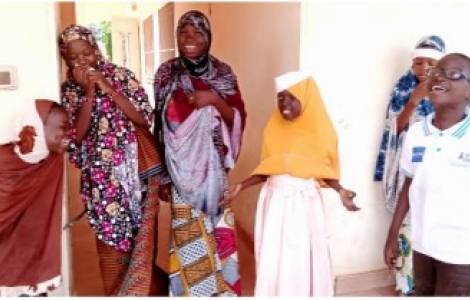
RC
Dosso (Agenzia Fides) - "Working with blind children, entering their world, understanding their silence and discretion, their fears, the isolation in which they live... has deeply shaped us, and dedicating ourselves to them, is not just a privilege, but we consider it a priestly vocation," said Father Rafael Casamayor, who spoke of the difficult conditions in which many visually impaired minors live in the parish of Dosso, where he works as a missionary. In Niger, 10% of the population has a disability, most of them visual impairment, caused by the mosquito-borne infectious disease onchocerciasis “Our goal,” says the priest of the Society of African Missions, “is that, within the framework of our possibilities, they can achieve the highest level of independence through education, specialized training and medical care and can thus integrate into a society from which they were previously excluded. " "We are not experts in these diseases, but we try to find solutions to their problems, to rekindle their hope, their joy, but also that of their parents, by expressing our friendship and closeness. If you give these children "the slightest attention, they react with a smile, they seem to open like a flower," said the missionary. "At the beginning, the visually impaired children told us their stories about how their parents often neglected them, didn't pay attention to them, considered them a curse, kept them isolated with the prospect that one day they would become beggars, while society seemed indifferent," reports Father Casamayor. In the past, they had to walk miles to get to school, which resulted in most of them having to drop out due to their disability and their parents' financial situation. "To alleviate this situation, together with the Zankey Handuriya (Children's Star) association in Dosso (see Fides, 1/12/2022), we have provided them with transport and organized a school canteen where they can go after lessons. In addition to basic medical and ophthalmological care, we offer them the education that is essential for them to be able to look after themselves: from mobility and orientation to learning and improving braille to the use of computers and iPhones , music and various manual activities." "The children we knew were fearful, withdrawn and sad," emphasizes the missionary, "now, after a few months of attending school and integrating into the group of classmates and the care team, we see them completely changed: communicative, smiling, happy and with much more self-esteem. Of course they are still blind, but they have gained a lot of independence and hope to move forward and feel useful in society through their commitment and persistence. For us it is a source of "joy and pride to see these children every morning with the happiness they convey and the determination with which they learn and get better every time." The “Zankey Handuriya” association takes care of blind children between the ages of 6 and 18, most of them from very poor families. The association currently looks after around 50 children and young people. The programs are carried out by the missionaries together with local volunteers in Gaya and Dosso, where they have now been joined by about 50 applicants, who, according to Father Rafael, "are a blessing that ensures the continuity of the project." (RC/AP) (Agenzia Fides, 21/11/2023)